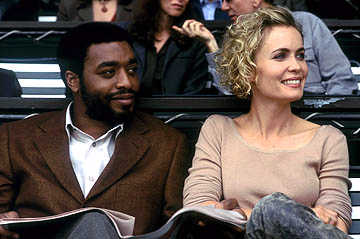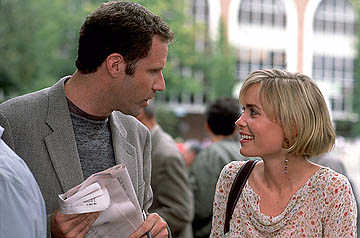

People can say what they want about Woody Allen, but he sure is consistent. He pumps out a film every year or so, and for a while, they've all been pretty mediocre. Most believe that he hasn't done anything spectacular in over a decade. Melinda and Melinda is a change of pace, only because it is his most ambitious film in recent memory. He still fails, but it is more spectacular and interesting than his other recent failures, which merely seem like laziness. The goal of Melinda and Melinda is to examine the differences and similarities between comedy and tragedy. To do this, Allen (Anything Else, Hollywood Ending) tells two stories that start from the same point, a woman named Melinda (Radha Mitchell, Finding Neverland, Man on Fire), who stumbles into a dinner party. They diverge from there, but frequently cross the same points, if only to see how differently each path was.
The first issue is the dialogue. It does not flow as easily as other Allen movies do, and sound very David Mamet-like, particularly when it comes from the mouth of Chloe Sevigny (The Brown Bunny, Shattered Glass), and to a lesser degree, Amanda Peet (The Whole Ten Yards, Something's Gotta Give). There is just no easy way to say "obsequious" in the course of normal conversation. Which brings to mind another point - Allen is trapped in the same make-believe world of all of his films. It's pretty close to the real one, but far enough removed to seem, well, quaint, and a bit old-fashioned. Everything is just out of touch enough to make it seem a bit strange.
The tragic Melinda story is the worse of the two because it's just dull. Melinda crashes the party of Laurel (Sevigny) and her husband Lee (Jonny Lee Miller, Dracula 2000, The Escapist). She is running away from some troubles in her life, and was supposed to show up months ago. This Melinda is flighty, unreliable, and not welcome in Lee's eyes. She is an artist, and Laurel tries to set her up with a dentist, but she gravitates towards Ellis (Chiwetel Ejiofor, She Hate Me, Love, Actually), a pianist. Lee is a struggling actor who's cheating on Laurel, who seems to be extremely rich with little to do. Melinda is hiding secrets from her past, and as she and Ellis get closer, these secrets, and another arbitrary plot twist, threaten her relationship.
The comedic Melinda story is much better. This Melinda stumbles into Susan (Peet) and Hobie's Will Ferrell, Anchorman, Starsky & Hutch) party. Melinda is a complete stranger, and lives in the same building. She's sick, and throws up, eliciting the sympathy of everybody around. Susan is a director looking for funding on her project, and Hobie is a struggling actor. This time, Melinda falls for the dentist, not realizing that Hobie fell for her. Every Allen movie either stars him or has a highly neurotic character standing in for him, and Melinda and Melinda has Hobie. Ferrell does a pretty good job too, adding in his amusing go-for-broke attitude to the role, bringing in a much needed sense of slapstick to the film. The twists in this story seem more contrived, yet seem better only because this story is more amusing. In fact, there is enough tragedy and comedy in this segment to offset the blandness of the other.
Mongoose Rates It: Not That Good. (The Melinda Tragedy: Pretty Bad. The Melinda Comedy: Okay).
2 hours, Rated PG-13 for adult situations involving sexuality, and some substance material.